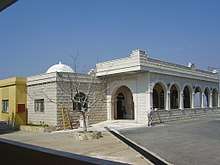Al-Muqtana Baha'uddin
Al-Muqtaná Bahā' al-Dīn (Arabic: المقتنى بهاء الدين), also known as al-Muqtaná Bahā' al-dīn ibn al-Hassan ʻAlī Aḥmad (المقتنى بهاء الدين أبي الحسن علي بن أحمد) or Baha' al-Din al-Samuqi (born 979 – died 1043) was an 11th-century Isma'ili, and founding leader of the Druze. He was born in a small village called Sammuqa near Aleppo in Syria and belonged to the Arab tribe of Tayy.[1][2]
| Part of a series on
Druze |
|---|
 |
|
Beliefs
|
|
Important figures |
|
Texts
|
|
Holy places |
|
Holy days |
|
Related topics
|
|
| Part of a series on Islam Shia Islam |
|---|
 |
|
Beliefs and practices |
|
|
Holy women |
|
|
Al-Muqtana is considered a founder of the Druze faith, the primary exponent of the divine call and author of several of the Epistles of Wisdom.[1]
Life
Al-Muqtana was appointed as a governor of Apamea, Syria, by Al-Hakim bi-Amr Allah, for whom he captured Aleppo from the Hamdanid dynasty in 1016. In 1017 he took the captive Abd al-Rahim ibn Ilyas from Damascus to Cairo after the latter's deposition by Al-Hakim. Along with Hamza ibn-'Ali ibn-Ahmad, he was one of seven believers who had defended the Raydan Mosque (near the Al-Hakim Mosque) successfully against twenty thousand attackers. Al-Muqtana was second in rank only to Hamza in the Druze movement and became known as the "left wing" to Hamza's "right wing". He was a prominent leading figure, especially after the disappearance of Al-Hakim,[1] and became the leader of the Druze in 1021, after the onset of persecutions by Al-Hakim's successor Ali az-Zahir, while Hamza went into hiding. Al-Muqtana resumed activities and coordinated the Divine call from 1027 onwards until he went into hiding as well in 1037. He continued writing until 1043, when the first Divine call ended and new conversions to become Druze were prohibited.[3]
Around 1035, a rebellion within the Druze movement was led by a Syrian apostate, Sukayn.[4] After a male messenger was murdered in the Wadi al-Taym, Lebanon, Al-Muqtana dispatched a delegation under a female Druze called Sarah, who may have been his niece. Sarah was renowned for her mission's success and demonstrating her sincerity of faith and knowledge. Her story is thought to have exemplified the gender equality of the new faith.[1]
Al-Muqtana wrote on a variety of subjects, ranging from universal intelligence to metempsychosis, and taught that "only the believer who applies himself to acquiring the sciences and truths leading to tawhid is exempt from the performance of ritual obligations."[5]
A shrine dedicated to Baha' ad-Din, probably identical with Al-Muqtana, is located at the Druze village of Beit Jann in Upper Galilee, Israel.

See also
- Divine call
- Rasa'il al-hikmah
- Hamza ibn-'Ali ibn-Ahmad
- Ad-Darazi
References
- Sāmī Nasīb Makārim (1974). The Druze faith. Caravan Books. ISBN 978-0-88206-003-3.
- Wahbah A. Sayegh (1996). The Tawhid Faith: Pioneers and their shrines. The Society.
- Daftary, Farhad (1990). The Ismāʿı̄lı̄s: Their History and Doctrines. Cambridge: Cambridge University Press. ISBN 978-0-521-37019-6.
- Swayd, Samy S. (2006). Historical Dictionary of the Druzes. Scarecrow Press. p. 143. ISBN 9780810853324.
- Nejla M. Abu Izzeddin (1993). The Druzes: A New Study of Their History, Faith, and Society. BRILL. p. 115. ISBN 978-90-04-09705-6.
